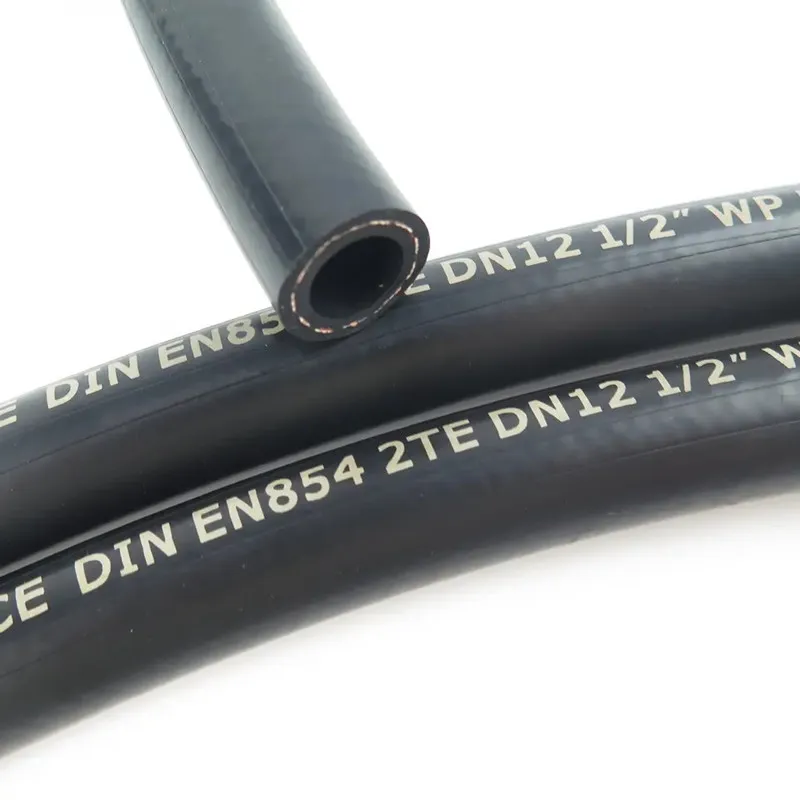Oct . 16, 2024 14:47 Back to list
Hydraulic Hose Applications for Tractors in Modern Farming Practices
The Importance of Hydraulic Hoses in Tractors
Hydraulic systems play a crucial role in the operation of modern tractors, enabling them to perform a wide range of tasks efficiently. At the heart of these hydraulic systems lie hydraulic hoses, which are essential for transmitting fluid power. Understanding the vital role that hydraulic hoses play in tractor functionality can help both operators and technicians optimize the performance and longevity of these machines.
What are Hydraulic Hoses?
Hydraulic hoses are flexible tubes designed to transport hydraulic fluid between components of a hydraulic system. They are made from durable materials, usually reinforced with layers of synthetic fibers or steel, to withstand high pressure and ensure strength. The composition and construction of hydraulic hoses allow them to handle extreme operating conditions while maintaining flexibility and reliability.
Key Functions of Hydraulic Hoses
1. Fluid Transmission The primary function of hydraulic hoses is to transport hydraulic fluid from the tractor’s pump to various functions such as the hydraulic cylinders, motors, and actuators. This transmission of fluid translates into mechanical movement, allowing the tractor to lift, steer, and perform various attachments with ease.
2. Pressure Resistance Hydraulic systems operate at high pressures, often exceeding 3000 psi (pounds per square inch). Hydraulic hoses are specifically designed to withstand these pressures without bursting or leaking. Choosing hoses that meet or exceed the required pressure ratings is crucial for safe and efficient tractor operation.
3. Flexibility and Reach Given the dynamic nature of tractor operations, hydraulic hoses need to be flexible and capable of reaching various components without kinking or twisting. This flexibility allows operators to maneuver and utilize their tractors efficiently in different environments, whether in the field or during road transport.
4. Temperature Tolerance Hydraulic systems can also experience extreme temperatures, whether from ambient conditions or the heat generated during operation. Quality hydraulic hoses are crafted to withstand a range of temperatures, ensuring they remain functional and do not degrade over time.
Choosing the Right Hydraulic Hose
Selecting the right hydraulic hose is critical for optimal tractor performance. Here are some factors to consider when choosing hydraulic hoses
1. Pressure Rating Always check the working pressure of the hose. It should match or exceed the maximum pressure of the hydraulic system to prevent failures.
tractor hydraulic hose

2. Size and Length The diameter of the hose affects the flow rate. A larger diameter allows for a greater flow but may be less flexible. Additionally, consider the hose length, as longer hoses can lead to pressure drops and reduced efficiency.
3. Material Compatibility Ensure that the materials used in the hose construction are compatible with the hydraulic fluid being used. Using hoses that are not compatible can lead to chemical degradation and failure.
4. Environmental Considerations Consider the environment in which the tractor will operate. Factors like exposure to UV rays, extreme temperatures, and abrasive conditions can affect hose longevity.
Maintenance and Care
To ensure the longevity and reliability of hydraulic hoses, regular maintenance is essential. Here are some maintenance tips
1. Visual Inspections Regularly inspect the hoses for signs of wear, such as cracks, bulges, or leaks. Early detection can prevent catastrophic failures.
2. Clean Connections Keep the hose connections clean to avoid contamination of the hydraulic fluid, which can degrade the system's performance.
3. Proper Storage When not in use, store the tractor in a sheltered area to protect the hoses from environmental hazards.
4. Replace When Necessary Do not hesitate to replace hydraulic hoses that show signs of excessive wear. The cost of replacement is far less than the cost of repairs resulting from hydraulic failures.
Conclusion
Hydraulic hoses are a fundamental component of tractor hydraulic systems, enabling efficient operation and a wide range of functionalities. By understanding the importance of hydraulic hoses, selecting the appropriate ones, and performing routine maintenance, tractor operators can ensure their machines operate efficiently and reliably. As technology continues to evolve, investing in high-quality hydraulic hoses will contribute significantly to the performance and durability of agricultural machinery.
-
Best Four Steel Wire Spiral Hose Hydraulic R12 – Durable High-Pressure Hose Manufacturer
NewsJul.08,2025
-
High-Quality 1/4 Hydraulic Hose – Soft, Flexible & Durable Rubber Hoses for Industrial Use
NewsJul.08,2025
-
1 1 2 Inch Hydraulic Flexible Hose - Durable, Reliable, High-Pressure Solutions
NewsJul.07,2025
-
High-Quality 1 2 Rubber Hose - Durable, Flexible Hydraulic Solutions
NewsJul.07,2025
-
Discover SAE Hydraulic Hose Types - High Quality & Durable Hoses from Leading Factory Supplier
NewsJul.06,2025
-
High Pressure Wire Hydraulic Rubber Hose Supplier Durable & Reliable 1SN Hose Solutions
NewsJul.06,2025
